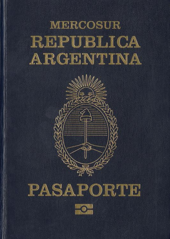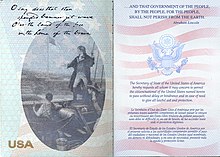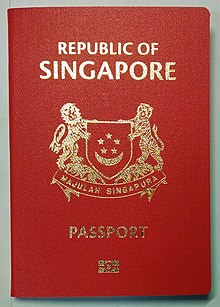Passport
[1] A passport allows its bearer to enter and temporarily reside in a foreign country, access local aid and protection, and obtain consular assistance from their government.In addition to facilitating travel, passports are a key mechanism for border security and regulating migration; they may also serve as official identification for various domestic purposes.[2] The passport takes the form of a booklet bearing the official name and emblem of the issuing government and containing the biographical information of the individual, including their full name, photograph, place and date of birth, and signature.Likewise, certain classes of individuals, such as diplomats and government officials, may be issued special passports that provide certain rights and privileges, such as immunity from arrest or prosecution.[a] Additionally, other types of official documents may serve a similar role to passports but are subject to different eligibility requirements, purposes, or restrictions.[10] Passports were an important part of the Chinese bureaucracy as early as the Western Han (202 BC – 9 AD), if not in the Qin dynasty.Only people who paid their zakah (for Muslims) or jizya (for dhimmis) taxes were permitted to travel to different regions of the Caliphate; thus, the bara'a receipt was a "basic passport".King Henry V of England is credited with having invented what some consider the first British passport in the modern sense, as a means of helping his subjects prove who they were in foreign lands.[15] In 1791, Louis XVI masqueraded as a valet during his Flight to Varennes as passports for the nobility typically included a number of persons listed by their function but without further description.[8]:92–93 A rapid expansion of railway infrastructure and wealth in Europe beginning in the mid-nineteenth century led to large increases in the volume of international travel and a consequent unique dilution of the passport system for approximately thirty years prior to World War I.The speed of trains, as well as the number of passengers that crossed multiple borders, made enforcement of passport laws difficult.[16] In the later part of the nineteenth century and up to World War I, passports were not required, on the whole, for travel within Europe, and crossing a border was a relatively straightforward procedure.During World War I, European governments introduced border passport requirements for security reasons, and to control the emigration of people with useful skills.[17] The British Nationality and Status of Aliens Act was passed in 1914, clearly defining the notions of citizenship and creating a booklet form of the passport.This enables border controllers and other law enforcement agents to process these passports more quickly, without having to input the information manually into a computer.Pursuant to the Vienna Convention on Diplomatic Relations, Vienna Convention on Consular Relations, and the immunity afforded to officials of a foreign state under customary international law, diplomats and other individuals travelling on government business are entitled to reduced scrutiny at border checkpoints when travelling overseas.A Republic of China citizen who does not have household registration (Chinese: 戶籍; pinyin: hùjí) in the area administered by the ROC[f] is classified as a National Without Household Registration (NWOHR; Chinese: 無戶籍國民) and is subject to immigration controls when clearing ROC border controls, does not have automatic residence rights, and cannot vote in Taiwanese elections.Additionally, because the ROC observes the principle of jus sanguinis, members of the overseas Chinese community are also regarded as citizens.British National (Overseas) passports are issued to individuals connected to Hong Kong prior to its return to China.British Overseas Citizen passports are primarily issued to individuals who did not acquire the citizenship of the colony they were connected to when it obtained independence (or their stateless descendants).For instance, only Bermudian passport holders with an endorsement stating that they possess right of abode or belonger status in Bermuda are entitled to enter America without an electronic travel authorisation.[36] This restriction disproportionally affects ease of travel for permanent residents of Indian, Pakistani, and Nepali ethnicity,[37] who were not granted Chinese nationality in 1997.As an additional consequence, Hongkongers seeking early pre-retirement withdrawals from the Mandatory Provident Fund pension scheme may not use BN(O) passports for identity verification.The People's Republic of China (PRC) authorises its Special Administrative Regions of Hong Kong and Macau to issue passports to their permanent residents with Chinese nationality under the "one country, two systems" arrangement.[70] Under the law of most countries, passports are government property, and may be limited or revoked at any time, usually on specified grounds, and possibly subject to judicial review.[73] When applying for a passport or a national ID card, all Pakistanis are required to sign an oath declaring Mirza Ghulam Ahmad to be an impostor prophet and all Ahmadis to be non-Muslims.Countries with conscription or national service requirements may impose restrictions on passport applicants who have not yet completed their military obligations.Each country has different requirements or conditions for the grant of visas, such as for the visitor not being likely to become a public charge for financial, health, family, or other reasons, and the holder not having been convicted of a crime or considered likely to commit one.[90] Similarly, since April 2017, nationals of Bangladesh, Pakistan, Sudan, Syria, Yemen, and Iran have been banned from entering the parts of eastern Libya under the control of the Tobruk government.2 Azerbaijan, Georgia, Turkey, Kazakhstan, Russia and the partially recognised republics of Abkhazia and South Ossetia each span the conventional boundary between Europe and Asia.









travel documentPassport (disambiguation)identityconsular assistanceborder securityregulating migrationofficial identificationemblementry and exit stampstravel visasbiometric passportsmicrochipauthenticationcounterfeitingDubai International AirportcitizenshipAmericanBritish nationalsdiplomatsimmunity from arrest or prosecutioncitizenstypes of official documentsEtymologicalopen trading pointsfeudalismcapitalismpoor reliefHebrew BibleNehemiahArtaxerxes I of PersiaArthashastraWestern HanQin dynastyIslamic CaliphatereceiptMuslimsdhimmis12th centuryRepublic of GenoaHenry V of England1414 Act of ParliamentPrivy Council of EnglandSecretary of StateHoly Roman EmpireDiet of AugsburgLouis XVIFlight to Varennesrailway infrastructureWorld War ILeague of NationsParis Conference on Passports & Customs Formalities and Through TicketsNansen passportsstatelessrefugeesmachine-readable passportsoptical character recognitionbiometricssmartcardsdigital signatureJapanese passportQing dynastyOttomanRussianWorld War IIBerlinIndonesianperform the HajjnationalsLaissez-passerCommonwealth stateslaissez-passersVienna Convention on Diplomatic RelationsVienna Convention on Consular Relationsimmunity afforded to officials of a foreign statecustomary international lawborder checkpointsaccredited diplomatsheads of stategovernmentUnited States of AmericaVisa requirements for Chinese citizensNational without household registrationBritish nationality lawNWOHRsindefinite leave to remainresident certificateRepublic of China citizenhousehold registrationChinesepinyinTaiwanese electionsconscriptionjus sanguinisoverseas ChineseCold WarTaiwanese passportsBritish citizensBritish passportCrown DependenciesIsle of ManJerseyGuernseyBritish National (Overseas)British Overseas CitizenBritish Protected PersonprotectorateBritish subjectBritish IndiaBritish overseas territoryBritish Overseas Territories citizenshipits own criteriaVisa Waiver ProgrameVisasoverseas Chinese diplomatic missionsright to landDocument of Identity for Visa Purposespermanent residents of Indian, Pakistani, and Nepali ethnicityMandatory Provident Fundin Latviain EstoniaSoviet occupationethnic RussiansUN Special RapporteurRussian visa policyEstonian alien's passportPeople's Republic of China